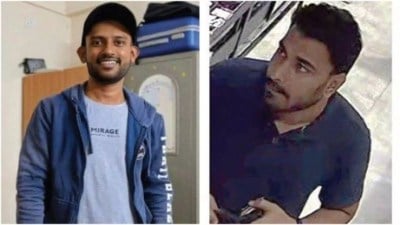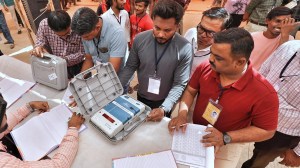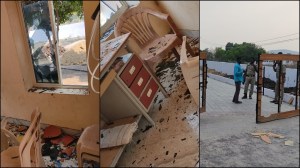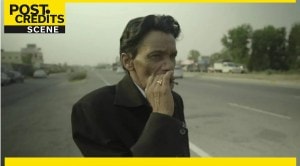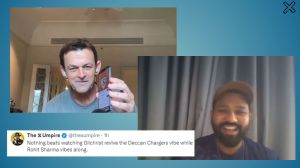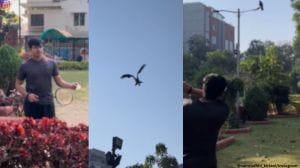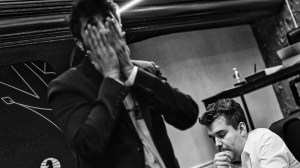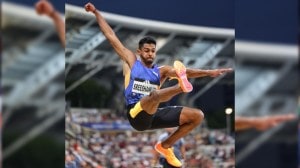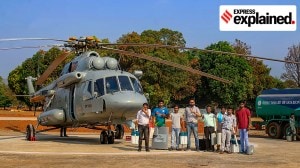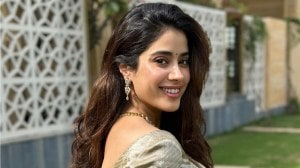- India
- International
In Chit Mahal childbirth, hope to end identity crisis
On Thursday last week, Ainul signed the form during the census drive in the enclaves in Cooch Behar district, effectively stating his willingness to be a citizen of India.
 Monalisa with her parents and sister at Poaturkuthi. (Source: Express photo by Partha Paul)
Monalisa with her parents and sister at Poaturkuthi. (Source: Express photo by Partha Paul)
In 2012, when Ainul Haque’s wife Muslina Bibi gave birth to daughter Anisha, the joy was lost in the everyday hardship that comes with being a person with no identity or not having a country to call as one’s own.
Three years later, when the 20-something farmer couple from Poaturkuthi, the Bangladeshi enclave in India, gave birth to their second child on July 4, at least their crisis borne out of the lack of any identity had paved way to joys of citizenship, and the rights that come with it.
“It is our ‘born in India’ baby,” said 26-year-old Ainul who has named the child Monalisa. “She will have a country of her birth, and surely a birth certificate from whatever local authority we come under in the days to come,” he added.
[related-post]
Although Ainul’s hope of finally getting the citizenship of his choice will materialize only with the physical transfer of the Indian and Bangladeshi enclaves on July 31, he and many like him have already done their part. On Thursday last week, Ainul signed the form during the census drive in the enclaves in Cooch Behar district, effectively stating his willingness to be a citizen of India.
It was during the drive that the news of the childbirth emerged as teams of enumerators went about updating the 2011 list of births, deaths, marriages and land transfer. But this childbirth was different in every aspect than others that took place before India and Bangladesh signed the Land Boundary Agreement earlier this year.

“During Anisha’s birth, I had to seek favour from my Indian friends just to get my wife admitted to a hospital in Cooch Behar,” said Ainul, who does not have any document to prove his address. This will change soon as the two countries will exchange the enclaves, putting to rest the centuries-old diabolical way of identifying the lands whose residents, besides being considered “second-class citizens”, have been often dubbed living in no-man’s-land.
“We are indebted to the governments of both the countries. I have no words to express my state of mind. It is the auspicious month of Ramzan and it will be a true Eid Mubarak for all of us,” Ainul said.
Muslina, too, was ecstatic, saying that the feeling is “very new”.
“After 23 years of my birth, I can now say that I am an Indian and my daughter would be an Indian by birth. Anyone outside the enclave would never understand what it means to us. People take their citizenship for granted but they don’t know what it means to have no identity or something as small as an address proof,” she said as she carries Monalisa in her lap outside from the darkness of her room.
Like the farmer couple, the Barmans of Shibaprasad Mustafi enclave, too, found “a new sense of Independence” with the birth of their first child, a baby boy, also on July 4.
Prakash Chandra Barman (22) and his wife Kakali (20), who learned that the district hospital was no more turning away patients, did not, however, want to take any “risk”.
“I got my wife admitted to the hospital with the help of my father-in-law who is of Indian origin,” said Prakash, and added that the hospital authorities have given “a temporary (birth) certificate”.
“They said they would issue a proper birth certificate in about a month,” said his wife.
Kakali also said that while she was in the hospital, she wasn’t worrying about being an enclave dweller anymore.
“I have seen how enclave residents have been deprived, looked down upon and even thrown behind the bars for no fault. But this time, I could proudly say that I was an Indian and I am happy for my son who has been born in India,” she said.
As is common among the enclave dwellers, the Barmans, too, did not get any formal education because they could barely ever get out of the enclaves.
But the couple hopes that their son, whom it has named Jeet, will achieve one.
“I have remained illiterate and worked in the field like my father but my son will not have to face such hurdles. Once we get our formal citizenship papers, I will go out to seek a better job and earn more money so that I can provide for my son’s education. We have an opportunity now,” Prakash said.
Apr 18: Latest News
- 01
- 02
- 03
- 04
- 05











